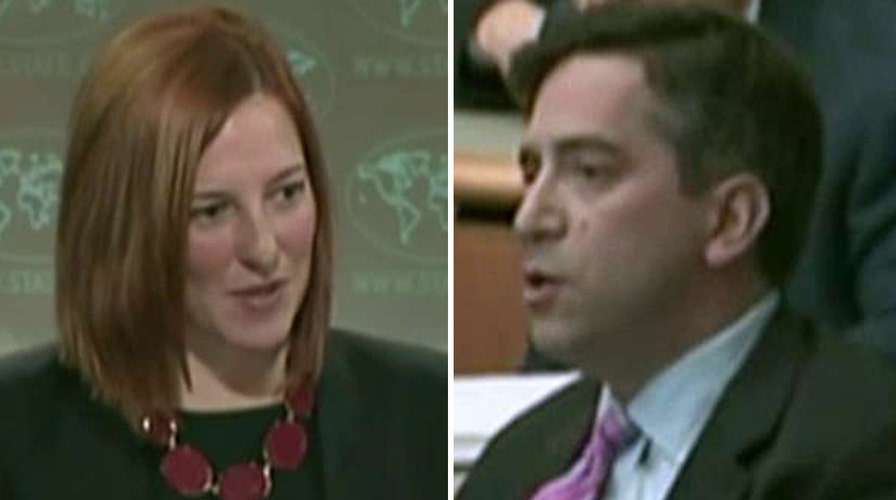State Dept. admits to deleting parts of Iran deal briefing
Exchange between Fox News' James Rosen then-spokeswoman Jen Psaki removed
EXCLUSIVE: An investigation by the State Department's top attorney has found that the official who ordered the censorship of a 2013 press briefing -- deleting an exchange between a department spokeswoman and a Fox News reporter -- specifically mentioned that exchange when ordering the doctoring of the video.
That fact, buried in a new report prepared by the department’s Office of the Legal Adviser, was ignored in the report's own conclusions about why the incident occurred, and conflicted with public statements about the report made by State Department spokesman John Kirby.
In presenting the findings to reporters on Thursday, Kirby weathered 33 minutes of intense questioning about the report's inconclusive results. Department investigators now say they do not know if a technical glitch or willful misconduct caused the deletion of the critical eight-minute exchange on Dec. 2, 2013 between then-spokeswoman Jen Psaki and Fox News chief Washington correspondent James Rosen.
At issue in the exchange was a previous one between Rosen and then-spokeswoman Victoria Nuland from February 2013. Asked if the U.S. and Iran were engaged in secret bilateral talks, Nuland said no such "government to government" contacts were taking place between the Obama administration and Tehran. In fact, such talks were underway for a year by the time Nuland denied them. (Earlier this year, Nuland claimed she had been kept "in the dark" about the Iran talks.)
In the December 2013 exchange, Rosen confronted Psaki about the falsity of Nuland’s prior statement and asked if it was the policy of the State Department to lie in order to preserve “the secrecy of secret negotiations.” “There are times where diplomacy needs privacy in order to progress,” Psaki said. “This is a good example of that.” For some two years, the State Department’s web page hosting that briefing contained a version of the video in which that exchange was excised and replaced with a white flash.
Kirby explained Thursday that a technician in the department's Bureau of Public Affairs recalled receiving a telephone call from a female superior back in December 2013, ordering the editing of the video. The legal adviser’s report said that while the technician “did not believe” the call had come from Psaki, the technician was otherwise unable to remember the identity of the superior.
Kirby added: "There’s no evidence to suggest [the deletion] was made with the intent to conceal information from the public and ... there is no evidence to indicate who might have placed that call or why."
What Kirby omitted was that the legal adviser’s report -- shared with news organizations on condition they not publish it in full -- did indeed contain evidence to indicate why the unidentified supervisor demanded the deletion, in a section of the report captioned “Evidence of Purposeful Editing.”
"The technician did not recall a reason being given for the edit request," the report stated, "but did believe that the requester had mentioned in the course of the call a Fox network reporter and Iran." The report continued: "The technician indicated that the requester may also have provided the start and end times for an edit."
The disclosure that the superior official specifically cited a Fox News reporter and his questioning about Iran when demanding the edit, and "may" even have provided the start and end times that ensured the relevant exchange would be excised, suggest the editing was a more deliberate act of censorship than State Department investigators and Kirby have publicly acknowledged.
In his briefing on the report's findings, Kirby downplayed the importance of the deleted exchange. At one point, he said, “the content had been discussed in previous briefings.”
In fact, the excised exchange was notable because, as CNN has noted, "Psaki, now the White House communications director, admitted the administration lied in order to protect the secrecy of the negotiations.”
Another issue skirted by both the investigators and Kirby is whether videos of State Department briefings, as archived on the department's website, are federal records. The determination is crucial because the Federal Records Act of 1950 makes it a crime to tamper with federal records, and the law was expanded under President Obama to cover "electronic records."
Both the report and Kirby maintained that briefing transcripts are considered federal records by the National Archives and Records Administration (NARA). But both the State Department’s legal adviser and its spokesman declined to say whether the videos of State Department briefings are likewise considered a federal record by NARA.
At Thursday's briefing, Kirby acknowledged the videos are shot with taxpayer-purchased cameras, operated by federal employees, and uploaded by federal employees to the website of a federal agency that is, in turn, maintained by federal employees. Kirby, though, said the department makes and uploads the videos “as a courtesy.”
Fox News’ James Rosen contributed to this report.





